Slave States
The United States was divided into free states or slave states.
A slave state was a state in the United States where slavery was legal, and a free state was a state in the United States where slavery was illegal.
The issue of slavery was one of the causes for the Civil War. Delaware, Maryland, Virginia, West Virginia, and Missouri were the northern border states.
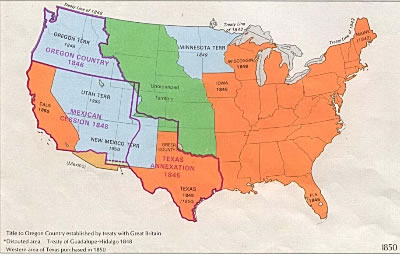
One of the biggest differences between the North and South was the issue of slavery. By 1846, all of the northern states had abolishedofficially ended or stopped slavery, but many slaves were still living in the South.
In the nineteenth century, the majority of slaves were decedents of original African slaves.
All slaves were expected to do whatever their masters told them. Some did, but many rebelled against their master, but they had to rebel silently. This rebellion may have been through prayer, education, or song.
Some slaves even tried to escape. If they were caught, they were either murdered or severely punished.
Learn more from firsthand accounts by visiting "Slave Memories." There are many memories; select at least five to read and to listen.
Frederick Douglass
Frederick Douglass was a slave who wrote and published his own autobiography: Narrative of the Life of Frederick Douglass, an American Slave, Written by Himself.
His first autobiography was written after his 1838 escape from his Maryland master. He discussed many events that happened along his journey.
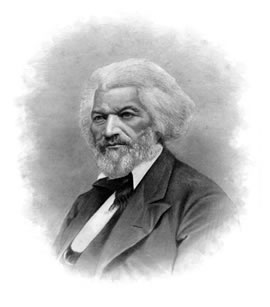
Music
Music allowed slaves to express forbidden feelings like anger or resentment.
Songs were coded, and slaves often sang just to pass the work time away. If you read or listen to the songs closely, you can find messages about their plans to escape, directions on how to get to the Underground Railroad, or expressions of grief from the struggles of being a slave.
Frederick Douglass described his views of slave spirituals in Chapter Two of Narrative Life of Frederick Douglass. Read this chapter to learn more.
Slave Spiritual
Listen to "Go Down, Moses."
This song was thought to be one of the oldest slave songs. It contained coded or secret messages. The song wasn't written down but passed down orally. It wasn't until 1862 that it was written down and published.
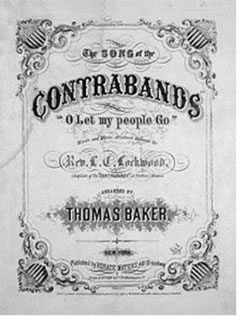
Underground Railroad Code Words
Use the words from the word bank below and match it to its secret meaning.
- Canada
- Fugitives to be expected
- The Underground Railroad
- Escaping slaves
- Big dipper or north star
Baggage
Answer: Escaping Slaves
Bundles of wood
Answer: Fugitives to be expected
Drinking gourd
Answer: Big dipper or north star
Canaan
Answer: Canada
Freedom train
Answer: The Underground Railroad
Watch "Ordinary People, Extraordinary Courage" (05:22).
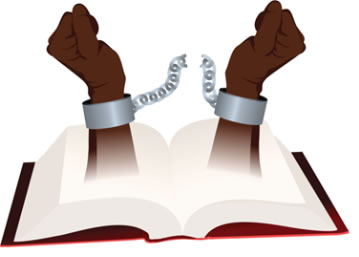
Listen to "Swing Low, Sweet Chariot."
Look at the charts on the next two slides to read a few lyrics, to understand the literal meaning, and to decipher the secret meaning of the song.

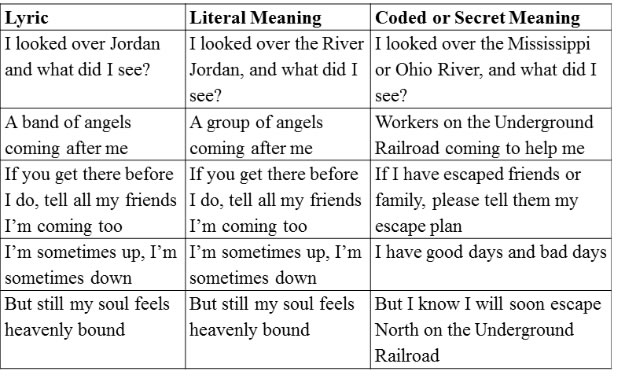
Slavery
Differing opinions on slavery erupted into a civil war and the secession of the South from the rest of the United States. Many slave-owners resented slaves for refusing to submit to their every command.
There were slave laws before the Civil War that essentially treated the slaves as property, so they could be traded and/or sold. They didn't have rights because they were not thought of as citizens.
For instance, in 1841 Proposition XII states in the Slavery and the Internal Slave Trade in the United States of North America, "Slavery is hereditary and perpetual." Proposition VI states, "The slave, being personal chattelan item of property , is at all times liable to be sold absolutely, or mortgaged or leased, at the will of his master."
After the Civil War, ex-slaves were given more rights. They could attend school and vote.
The Emancipation Proclamation in 1863 proclaimed the freedom of slaves in the ten states that were still in rebellion.
However, there were many southern states that controlled the ex-slaves' rights and forced them to work or pay a high tax.
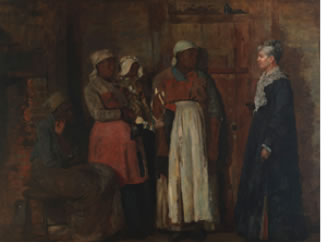
Sojourner Truth was born Isabella Baumfree in 1797.
She said that God gave her another name in 1843, "The Lord gave me the name SojournerA temporary resident. because I was to travel up and down the land showing the people their sins and be a sign unto them.
Afterward I told the Lord I wanted another name because everybody had two names; and the Lord gave me TruthA fact or belief that is accepted as true. , because I was to declare the truth to the people."
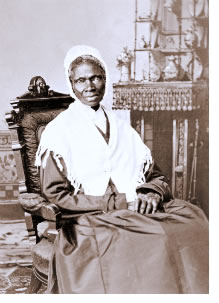
Sojourner Truth was recognized as one of the most influential human rights activists in reform movements. She was born into slavery, but in 1827 she began preaching.
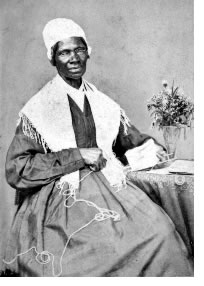
"Ain't I a Woman?"
She delivered a speech called "Ain't I a Woman?" in Akron, Ohio in 1851 during the Women's Rights Convention.
Truth discussed the injustices faced by the black female population and how women were considered powerless through the eyes of men.
Through her speech, she brought an awareness to the general population about the lack of equality faced by women, especially the women who were still enslaved.
Her speech gained attention from President Abraham Lincoln where she met him in the White House.
Read Sojourner Truth's speech "Ain't I a Woman?
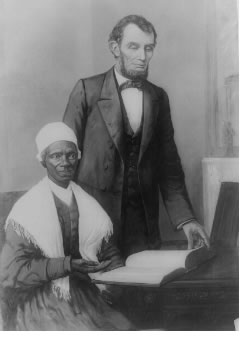
Why do you think Truth asked, "Ain't I a Woman?"
Answer: She has never gotten special treatment for being a female. She is trying to point out the absurdity that gender is a cause for special treatment.
Summarize Truth's arguments in your own words.
Answer: Truth rejects that women should be treated differently and more gently; she has never been treated that way and she's turned out fine. Women are, in fact, quite powerful as evidenced in her Christian faith.
Why does Truth address her audience as "children"?
Answer: She was being ironic because women were treated as children.
What is the tone of Truth's speech?
Answer: Her tone is sarcastic and angry.